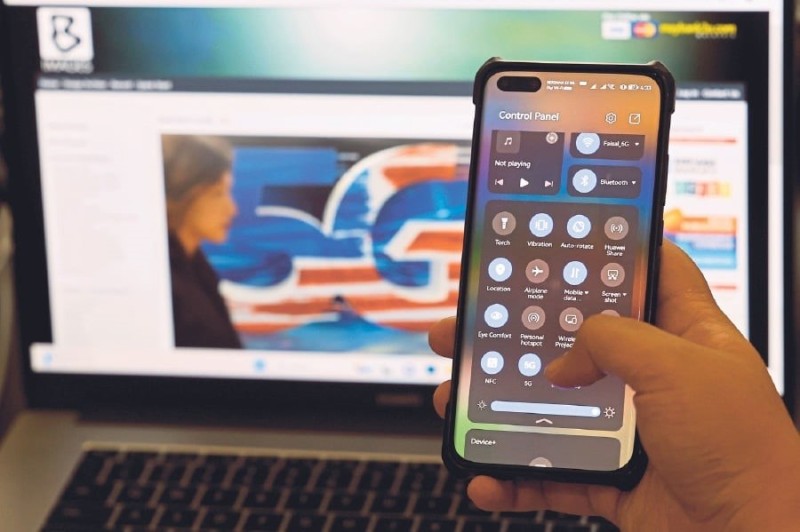
KUALA LUMPUR: The adoption of mass-market 5G-powered services is expected to be rapid and robust, as telecommunication (telco) operators will have greater scope and incentive to keep consumer costs fairly low.
According to BMI Research head of technology and telecoms research Andrew Kitson, the Malaysian model – where existing telcos are obligated to take an investment position in the business, is likely to prove more robust.
In comparison, the high cost of building and commercialising competing 3G, 4G, and 5G networks in other markets has weighed on all industry stakeholders' bottom lines.
Kitson noted that profitability has been slow to materialise for many players, while some have not survived to maturity, and these issues were behind recent mergers and acquisitions (M&As) in many Asian markets, including Malaysia (CelcomDigi).
Nevertheless, he said that the Malaysian 5G model raises concerns about conflicting shareholder demands that might affect the pace or direction of deployment plans in specific regions.
Kitson also pointed out that the government's plan to press ahead with a second wholesale 5G network also presents some downside risks.
He said the main risk is a potential oversupply; a second 5G network may not be used to its full potential if the existing operators do not participate in that and try to compete with it for customers.
"It would be helpful if the government were to lay out in some detail the business model and strategy for the second 5G network—will the five telcos be required to invest in that? Will asset duplication occur? Will the second 5G network serve a specific type of customer?
"The ideal would be for the DNB-backed 5G network to serve basic mass-market connectivity needs and for the second network to serve specific enterprise, industry, or government needs that do not overlap with or cannibalise the business of the DNB network," he noted.
Last week Malaysia's four major mobile network operators—CelcomDigi Bhd through Infranation Sdn Bhd, Maxis Broadband Sdn Bhd, U Mobile Sdn Bhd, and YTL Communications Sdn Bhd through YTL Power International Bhd— acquired equity stakes in Digital Nasional Bhd (DNB).
The fifth telco, Telekom Malaysia Bhd (TM) has until August 21, 2024, to get shareholder approval to complete its share subscription agreement (SSA).
DNB has been tasked with selecting operators for Malaysia's second 5G network.
Under the terms of the SSAs, the five telcos are to collectively acquire a 70 per cent equity stake in DNB, with each telco holding a 14 per cent stake.
The government, represented by Ministry of Finance Incorporated (MoF Inc.), will retain a 30 per cent stake and a special share in DNB for a designated period.
Kitson said that under the DNB scheme, operators will not be able to differentiate in terms of quality of network or coverage.
"Therefore, they must look to innovate at the service level and target new addressable markets with customised applications and services in order to attract and retain users," he told Business Times.
Kitson said BMI currently forecasts that the number of 5G connections in Malaysia will reach 32.32 million by the end of 2033, accounting for 55 per cent of all mobile connections and 86.0 connections per 100 inhabitants.
Commenting on the SSA, Kitson said that the four operators who signed their respective agreements will bring relief to the sector's principal stakeholders and allow them to plan their medium-term investment strategies in more detail.
He said although TM has yet to sign, it has committed to doing so and is the least likely of the five telcos to back out of the project owing to its links to the state.
"DNB can now proceed to finalise the design of its infrastructure and begin tendering network vendors for key equipment.
"Work to identify areas where new infrastructure, such as towers and power supply points, can also proceed more rapidly, so suppliers of ancillary infrastructure can now accelerate rights of way and access planning.
"All five operators will now be able to develop service packages and pricing strategies for 5G services, though much work still needs to be done to ensure harmonisation of key back-office solutions (such as customer verification and authentication, billing processes, interconnection solutions) to ensure that no operator is left at a technical disadvantage," he added.
Kitson also highlighted that investors will also be relieved that the project is officially proceeding as operating expenses can begin to be trimmed – older 2G/3G networks and support systems can now be wound down, and ongoing 4G investments can be rationalised.
He noted that the shared investment nature of the DNB project means that 5G rollout costs will not be as high as in other markets where each operator had to build its own network, and issues with overbuilding and duplication of assets have weighed on returns on investment.
"The government will also be relieved that the project is making progress, as the rapid deployment of affordable 5G connectivity is key to its long-term plans for economic diversification and growth through the harnessing of disruptive new technologies.
"The government is likely to have been concerned about the risks of being seen as lagging behind Singapore in the race to become the region's 'digital hub'," he said.
Source: https://www.nst.com.my/business/corporate/2024/07/1071015/robust-malaysian-mode

